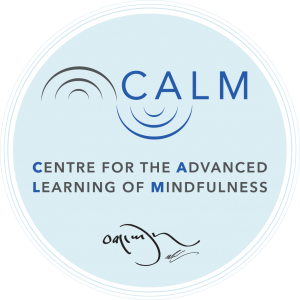“I THINK IN THE WATER ITSELF WE CAN SEE THESE QUALITIES AND ALL THE PHENOMENA OF THE MIND. THEY ARE SHOWING THAT THEY ARE THE TEACHER REVEALING THE PATH.”
His Holiness the 17th Gyalwang KarmapaCALM PHILOSOPHY

The ‘deep path’, or the Buddhist framework of mindfulness, explains the path of the meditation practice through the ‘Waterfall’, ‘River’ and the ‘Ocean.’ The Mindfulness for Earth Programme by CALM connects the states of our mind with the wisdom of the natural environment. To help deepen this understanding, CALM philosophy and eco-contemplative methods are grounded in the ‘Waterfall’, ‘River’ and the ‘Ocean’ mindfulness-based practices (read below).
Please scroll down to the bottom of this page for more information on the Mindfulness for Earth Programme by CALM.
Mindfulness for Earth Programme has been developed, delivered, tested and researched over a period of 10 years by our CALM Founder Dr. Kumanga Andrahennadi through her professional work and the Ph.D. research at the University of Dundee, Scotland, U.K.
At first, when we begin to meditate, we may experience the intense activity of our mind like that of a ‘Waterfall’ pouring over a cliff. During this practice, each time our mind wanders away, we may simply bring our attention back to observing the ‘Waterfall’. Deepening the practice, as we become the ‘Waterfall’, we can watch the water droplets (the activity of the mind) as they fall and merge into becoming a large circular pool. During the ‘Waterfall’ practices, allowing ourselves simply to become aware of the activity of the ‘Waterfall’ as it is can result in overcoming any misconceptions about the nature of the activity of the mind and the meditation practice. As a result, we may experience a calmer mind through the ‘Waterfall’ eco-contemplative practices.
As we continue to practice, our mind will eventually become a peaceful ‘River’ meandering through a valley. The intense activity of our mind gradually slows and loses its power to become more like a ‘River’. As we enter the ‘River,’ we’ll find our mind becomes calmer and our thoughts flow smoothly, with occasional interruptions like water running over rocks. As we explore the ‘River’ eco-contemplative practices, we will begin to experience the notion of cultivating the ‘Fourteen Natural Qualities of the Mind’. This notion relates to the arising and cultivating positive states of the mind such as acceptance, gratitude, openness, compassion and confidence, which will not become affected by our outer circumstances such as people or situations presented in life. As we continue to flow in the ‘River’ practices, we will begin to recognise glimpses of the gaps between our experiences. And as we continue to maintain the recognition of these gaps through the ‘River’ eco-contemplative practices, we will be able to extend the length of our awareness of these gaps, and as a result, our mind will become calmer and more clear.
As we practice regularly over a period of time, eventually our mind will become the calm ‘Ocean’ without waves. Any disturbance of the mind, such as the waves of the ‘Ocean,’ will soon dissolve back into the vast ‘Ocean’ itself. As our ‘Ocean’ practice deepens, the clarity of our mind improves, and the insights gained through the practice will become like reflections on calm waters in a vast lake. As a result, we will be able to lessen our negative reactions, leading to a happier and balanced lifestyle and a flourishing of our overall well-being. The reflective nature of the ‘Ocean’ eco-contemplative practices can further guide us to recognise the notion of the ‘Ripple-Effect’ in gaining a deeper experience of the interdependent nature of phenomena. This direct experience can further help us to take ethical actions in life through recognising the interconnectedness of life and enabling us to better take care of ourselves and Planet Earth.
MINDFULNESS FOR EARTH PROGRAMME BY CALM



The Mindfulness for Earth (M4E) framework has been developed based on the Buddhist philosophical framework of mindfulness also known as the ‘deep path’, as well as the Western scientific framework of mindfulness also known as the ‘wide path’.
CALM currently offers workshops and courses such as the ‘M4E 8-Week Course’, ‘Introductory Calming the Mind Mindfulness Workshop’ and the ‘One-Year M4E Teacher Training Programme’ that are all based on the M4E framework.
The M4E framework has been delivered and tested for more than 10 years through the implementation of the M4E Programme in different settings for children, young people and adults. The M4E Programme has been developed and researched by our CALM Founder, Dr. Kumanga Andrahennadi, through her professional work and the Ph.D. research at the University of Dundee, Scotland, U.K. For more information, please visit the ‘Online’ training and the ‘M4E Teacher Training’ pages within this website.
The M4E Programme explores the Buddhist philosophical framework of mindfulness, also known as the ‘deep path’, through the ‘Four Establishments of Mindfulness’ namely, ‘Mindfulness of the Body’, ‘Mindfulness of Feelings’, ‘Mindfulness of the Mind’ and ‘Mindfulness of Phenomena’. The ‘Four Establishments of Mindfulness’ will be explored together with the mindfulness-based practices of the water element under the themes of the ‘Waterfall’, ‘River’ and the ‘Ocean’. Aimed at students gaining a further insight into the true nature of our suffering (e.g. depression/anxiety), the M4E Programme will further investigate the Buddhist philosophical terms the ‘Four Noble Truths’ and the ‘True Nature of Phenomena’. The students will also learn how to recognise and cultivate positive mental qualities such as equanimity, empathy, resilience and compassion as a method to alleviating mental suffering. As such, the students will learn to deeply experience and integrate the eco-contemplative practices from the ‘deep path’ into their daily lives.
In addition, the M4E Programme explores the Western scientific applications of mindfulness, also known as the ‘wide path’, through the Mindfulness-Based Cognitive Therapy (MBCT) framework. The students will learn key mindfulness-based practices from the ‘wide path’, such as the ‘Body Scan’ and the ‘Three Step Breathing Space’ practices rooted within the Mindfulness-Based Cognitive Therapy (MBCT) curriculum. As such, the students will learn to deeply experience and integrate the mindfulness-based practices from the ‘wide path’ into their daily lives.
The group enquiry aspect of the M4E Programme is facilitated through the method of ‘Bohmian Dialogue’. The dialogue/Q&A sessions will support the students in reflecting on their personal experiences of the mindfulness practices and clarify any questions they may have. These sessions will also help further expand students’ knowledge of integrating the mindfulness practices from the ‘deep path’ as well as the ‘wide path’ into their daily professional/personal lives.
To support you on a personal and an individual journey, during the ‘M4E 8-Week Course’ or the ‘1-year M4E Teacher Training Programme’, you will receive recommendations on how to integrate and reflect on the mindfulness-based eco-contemplative practices through recorded guided meditations and a journaling process. And this way, you will learn to develop a regular practice in work/home environments.
All students who complete the M4E Programme (all workshops and courses) will receive a digital attendance certificate issued by CALM. Places are limited to a maximum of 25 participants per workshop/course. Please click on the ‘More Information’ buttons below to read more information and to reserve your place at the next LIVE online M4E Programme delivered by CALM.
